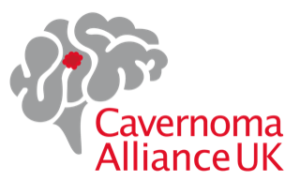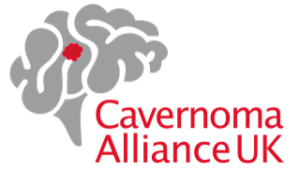Questions to ask your Neurologist or Neurosurgeon
Meeting your neurologist or neurosurgeon for the first time is a very important step in learning about your condition. We prepared a list of sensible questions to ask your neurologist to better understand your situation.
We often recommend attending your appointments with someone you trust, so they can take notes while you talk, or so they support you.
Your Family Doctor
Your GP is probably not an expert in vascular abnormalities and will most likely refer you to a consultant (a senior medical doctor who does specialise in a particular field of medicine) – in this case a neurologist or neurosurgeon. Your GP will refer you to a consultant that maybe located in your area.
According to the NHS Choices website, it is now possible to select the particular neurologist/neurosurgeon you would like to see:
“Under the NHS Choose and Book scheme, you can choose the hospital or clinic where you would like to receive treatment, as long as your GP feels that you need to visit a particular hospital or clinic to receive appropriate medical treatment”.
If you choose a specific geographical location, always check with your doctor that you meet the eligibility criteria for your specific country.
Questions to ask your Neurologist
Based on questions from the Angioma Alliance website, Cavernoma Alliance UK has adapted these questions you might want to ask your neurologist (or neurosurgeon).
Probably it is a good idea to be accompanied by someone you trust and consider taking notes to review later.
General Questions
- What size is the cavernoma? (The neurologist may prefer to use the term cavernous angioma, cavernous haemangioma, malformation or CCM.)
- How many cavernomas do I have?
- What is the exact location of the cavernoma?
- What functions does this area of the brain perform?
- Do there appear to be any venous or other malformations in the vicinity of the cavernoma? (A developmental venous anomaly (DVA), also known as cerebral venous angioma, is a malformation of veins which drain normal brain.)
- Does it appear to have bled previously?
- In your opinion, what are the conditions under which you recommend surgery to remove a cavernoma?
- Are there any other treatments you consider?
- What tests do you recommend? (MRI, f[unctional] MRI, MRA, angiogram, etc)
- If I had another bleed, what deficits would you expect? /
- What symptoms would justify a call to you or a visit to A&E?
- Should I have my children (or anyone else in my family) tested? If so, how do I go about it?
- Should I have a genetic test to determine if I have the hereditary form of the condition?
- Should I be concerned about possible cavernomas in other areas of my body?
- Should my spine be scanned?
- How did I get/develop a cavernoma?
- Are there any vitamins or supplements I should take to improve my situation?
- Can I exercise?
- Can I participate in sports? What about contact sports such as football or ski-ing that might include a blow to the head?
- What restrictions in activities do you recommend?
- Are you concerned about my blood pressure?
- Are blood thinners (such as ibuprofen) suitable for someone with a cavernoma?
- What medications, prescriptions and over the counter, do you recommend I avoid?
- Are there any vitamins or supplements to avoid?
- Is it safe to travel by “plane” with a cavernoma?
- Can I visit locations with a high altitude?
- Can I drink alcohol or caffeinated drinks?
Management Questions
- How often will I have follow up tests (and which ones)?
- How often will I consult you or a member of your team?
- What will you be looking for while treating me? (What changes are you looking for?)
- Is there anything I can do to minimize the risk of a bleed (or re-bleed)?
- What is the risk of my cavernoma re-bleeding?
- How would I know if I had another bleed? (i.e., what symptoms would I expect to see?
- What would cause you to recommend surgery?
Questions to ask your Neurosurgeon
Your GP or neurologist may refer you directly to a neurosurgeon. If so, you may want to include some of the questions from the previous two sections in addition to these more specific neurosurgical questions.
Surgery Recommendation
- How long would you estimate the surgery to take?
- How long would you estimate for recovery from surgery?
- How long will I be in the hospital?
- When do you expect I will be able to return to work and /or daily responsibilities?
- What, if any, additional deficits would be possible as a result of the surgery?
- Would you anticipate any of the deficits to be permanent?
- Can my cavernoma come back after surgery?
Surgeon's Background
- How many procedures of this type have you performed?
- Do you have a cerebrovascular specialization?
- How many cavernoma have you removed surgically?
- (If you have a brainstem cavernoma) How many of these were brainstem cavernomas?
Second Opinions
A second opinion from another neurologist/neurosurgeon may help you to think clearly and get the answers you need to make informed decisions.
“If you would like a second opinion after seeing a consultant you need to go back to your GP and ask them to refer you again. If your GP agrees to refer you to a new consultant, the consultant will be told that this is your second opinion. They will also be sent any relevant test results or X-rays previously carried out. This does not mean that the new consultant will automatically take over your care. If you want to be treated by the new consultant, this will need to be arranged with the doctors and hospital.”
NHS Choices website
Further Information
Sometimes its useful to have a physical copy of the questions presented here. Please use the button below to download a copy of these questions as PDF you can print off and use during your appointment.
We have also prepared some hints & tips for when you speak to your specialist. Please use the Hints & Tips page below to access this information.

For emotional and practical support please contact us, please see our contact page
